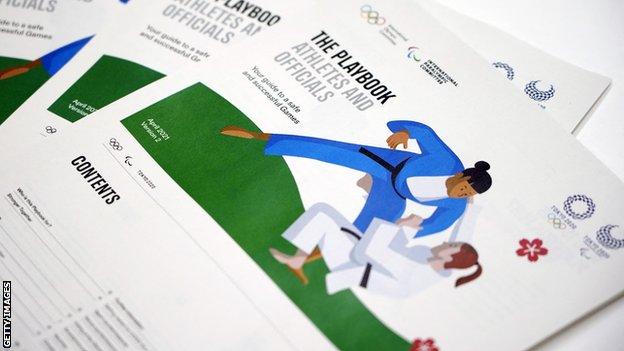Tokyo 2020 Olympics: Competitors to be tested daily for Covid-19
- Published

The Tokyo Olympics runs from 23 July-8 August, followed by the Paralympics from 24 August-5 September
Competitors will have daily Covid-19 tests at this summer's Olympics and Paralympics in Tokyo.
They will also need to wear face masks except when they are "eating, drinking, sleeping, training or competing".
And those travelling from outside Japan will be given a phone with apps for health reporting and contact tracing.
There will be no international fans but a decision on whether local fans can attend the Games will be made in June.
There is no requirement for athletes to be vaccinated but they will need to undergo a three-day quarantine on arrival.
An updated version of the athletes' playbook, which lays out the guidelines for the Games, was released on Wednesday.
It stated:
People travelling from outside Japan will have to take two tests before flying
Athletes will be given daily tests "to minimise the risk of undetected positive cases"
Other Games participants will be tested for the first three days after they arrive and will then receive regular tests
No participants can use public transport and will instead use dedicated Games vehicles
Passengers in the vehicles must refrain from conversation
Those at the Games can eat only in catering facilities at on-site venues, restaurants at their accommodation or in their room
An athlete who "intentionally refuses" to take a test could be sent home.
Japan is in a state of emergency until at least 11 May after a rise in coronavirus infections.
"We are confident that compliance with these regulations will ensure the safety and security of athletes, Games officials and spectators, as well as the people of Tokyo," a statement from Games organisers added.
However, the playbook has been criticised by the World Players Association for falling "well short of the best practice measures urgently required".
In a statement, Brendan Schwab, the executive director for the association that represents more than 85,000 professional players across sports, said: "Athletes worldwide demand and deserve an environment at the Olympics that they can trust and have confidence knowing that the public health effort in Japan and globally will not be undermined, athlete health and safety will be protected and the integrity of sporting competitions unaffected by Covid-19. The Playbook fails to deliver that trust and confidence.
"It is simply unacceptable that the Playbook makes athletes assume the risks arising from their participation at the Games and does not provide full and comprehensive insurance for all related risks."
Schwab added: "Many questions also remain unanswered in relation to proper athlete treatment and care, education, sport specific measures and the precise steps being implemented in stadia, dining areas and other indoors environments to ensure safe and secure participation at the Games."
The Olympics are due to begin on 23 July, with the Paralympics set to start on 24 August.

Snooker-tastic!: The heroes and villains that helped snooker reach its glory years
Have an evening in with films on iPlayer: From action to romance, there's a movie for everyone
